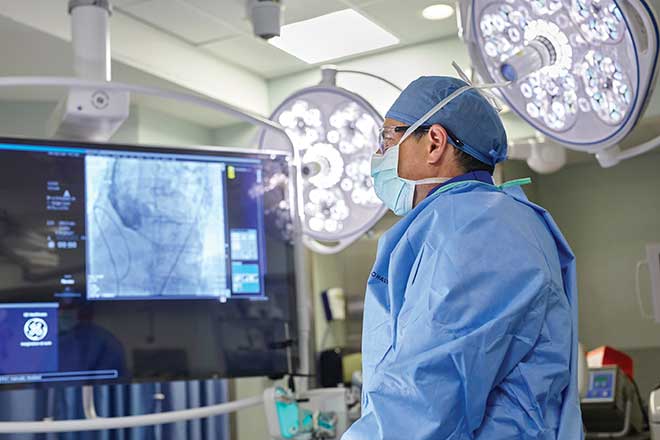Thanks to a recently FDA -approved procedure offered by SLUCare’s heart valve clinic, a local man in his 80s has hope. He’s suffering from aortic valve stenosis, a disease that causes the aortic valve opening to narrow, restricting blood flow. The condition is serious: It can cause shortness of breath, chest pain or pressure, fainting, palpitations and a decline in activity level. It also shortens life expectancy.
Just a few years ago, this patient would have had two grim choices: enter hospice or risk open-heart surgery, the traditional method of replacing the valve. The latter would have required a difficult recovery and likely would leave an elderly patient in worse shape, says his doctor, SLUCare’s Dr. Richard Lee. Either way, he would no longer be able to care for his wife, who has Alzheimer’s. Soon, though, he will undergo tra
TAVR marks a significant improvement in care for high-risk patients, Lee says. “The first study showed at the one-year mark a 20 percent improvement in survival, one of the largest survival advantages we’ve seen for any therapy,” he says. Besides its monumental impact on mortality for acute aortic valve stenosis patients, TAVR also offers shorter recovery time and lessens the chance of complications inherent in open-heart surgery, such as renal failure and pneumonia. “If you fix the valve through the conventional sternotomy, it takes two months—usually double that for elderly patients—to heal up,” Lee says. “Instead of being out of commission for a long time, this is more like a regular sick leave.”
Patients with all manner of valve disorders can find help at the SLUCare valve clinic, Lee says, and it’s one of only a few centers in the area able to offer transcatheter options for both aortic valve stenosis and mitral regurgitation. The clinic has a team of highly trained cardiac specialists brought together in one place, including a heart surgeon and an interventional cardiologist. “Patients are able to get multiple opinions with one appointment,” Lee notes.
Although TAVR is currently available only to high-risk patients, Lee says future research might find it to be a viable option for lower-risk patients, too. “In years to come, we might be able to solve any valve issue with just a puncture in patients’ arteries and veins,” he says. For now, Lee is focused on his elderly patient’s outcome, glad to be able to present him with a viable option. “Offering him something like TAVR would not have been possible a few years ago,” he says.
Pictured: SLUCare cardiovascular surgeon Dr. Richard Lee
Photo courtesy of SLUCare physician group
SLUCare Physician Group’s heart valve clinic is run by Dr. Richard Lee and Dr. Michael Lim. It offers transcatheter aortic valve replacement (TAVR), a minimally invasive procedure for high-risk patients with aortic valve stenosis, at SSM Health Saint Louis University Hospital. Pictured on the cover, seated: SLUCare cardiovascular surgeon Dr. Richard Lee; standing: SLUCare cardiologist Dr. Abhay Laddu and Dr. Michael Lim. For more information, call 314.977.4440 or visit slucare.edu/heartvalve.
